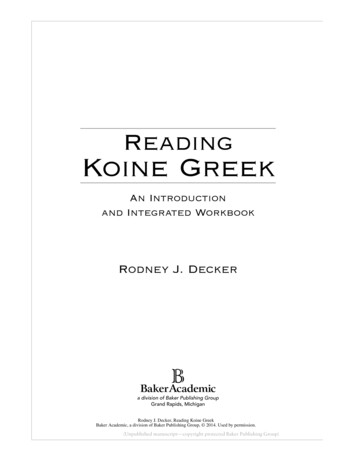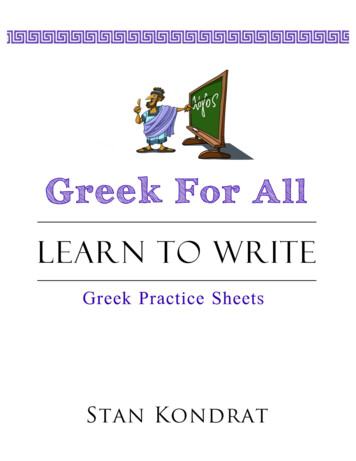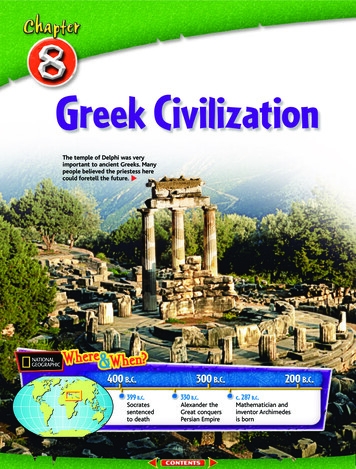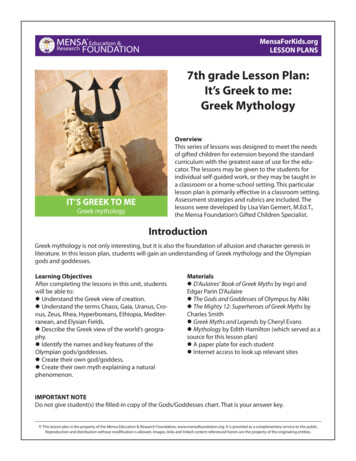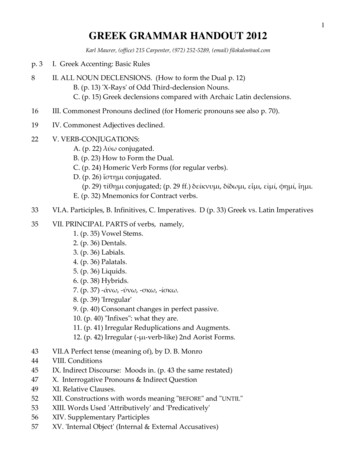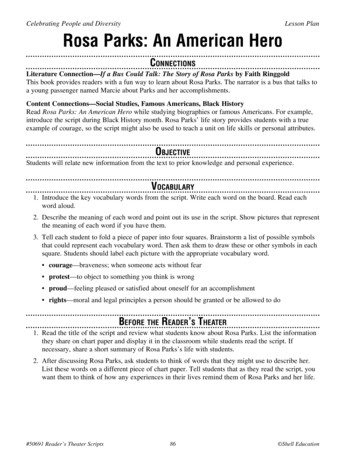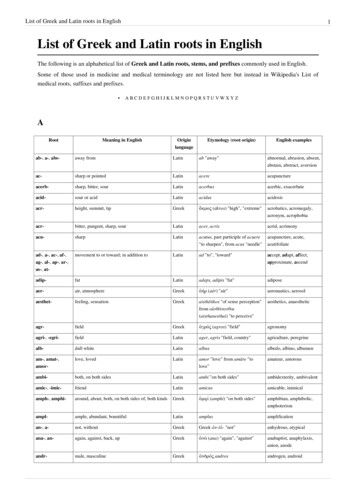
Transcription
The Characteristics of GreekTheaterGHS AH: Drama
Greek Theater: Brief Historyn n n Theater owes much to Greek drama, whichoriginated some 27 centuries ago in 7th centuryBCE.Greeks were fascinated with the mystery of theart form.Thespis first had the idea to add a speakingactor to performances of choral song and dance.The term Thespian (or actor) derives from hisname.
Greek Theater: Brief Historyn n n Greek plays were performed in outdoortheaters, usually in the center of town oron a hillside.From the 6th century BCE to the 3rdcentury BCE, we see the development ofelaborate theater structures.Yet, the basic layout of the theaterremained the same.
Tragedy and Comedyn n n Both flourished in the 5th and 4th centuries BCE,when they were performed, sometimes before12,000 or more people at religious festivals inhonor of Dionysus, the god of wine and thepatron of the theater.Tragedy dealt with stories from the pastComedy dealt with contemporary figures andproblems.
Introduction to Greek DramaVideo segment: About DramaComplete the worksheet as you watch thevideo segment.n The masks of comedy and tragedy areemblems of theater today. . . and theyoriginated in ancient Greece.n
What are the parts of a Greektheater?
What is a Greek Chorus?n n n The Greek Chorus was a group of poets,singers, and/or dancers that wouldcomment on events in the play.12 to 50 members would normallycomprise the chorus.They would explain events not seen by theaudience (ex. battles in a far awaycountry)
What is a Greek Chorus?n n The chorus would interact with theaudience, and try to get them to takesides with the characters in the play.The chorus expressed to the audiencewhat the main characters could not say,such as their hidden fears or secrets. Thechorus often provided other characterswith the insight they needed.
What is a Greek Chorus?n n The Greek chorus usually communicatedin song form, but sometimes spoke theirlines in unison.The chorus worked together to explain theplay because normally only 1 to 3 actorswere on stage who were playing severalparts each.
What is the purpose of GreekTheater?The Greeks were interested in ethics,democracy and the art of thinking, so theirplays explored these concepts.n The purpose of a Greek drama/theaterwas:“to pursue lofty moral themes, expand theintellect, and explore ethical issues.”n
Greek Playwrightsn n Aeschylus 525-456 BCE. Increased thenumber of actors from one to two,involved the chorus more into the action,and emphasized dialogue.Sophocles 496-406 BCE. Added a thirdactor, and centered the action into one,thus creating a more dramatic andpowerful play.
Greek Playwrightsn n Euripides 485-406 BCE. He incorporatedhumor into his plays, thus breaking the rigidrules of tragedy and made it easier for newforms of drama to develop.Aristophanes 450-380 BCE. His plays aremarked by wit, invention and skillful use oflanguage as well as a satiric view of politics ofthe day.
Reader’s Theatern n What is it?It is a dramatic presentation in which 2 ormore oral readers interpret a characterizedscript aiming to stimulate the audience’simagination about the literature beingpresented.
Video Segmentn n Oedipus the King or Oedipus Rexwritten by Sophocles in the 5th centuryBCE.Oedipus learns that King Laius has beenmurdered. In this scene, Oedipus argueswith Teiresias. Oedipus fails to see thathe, in fact, mistakenly killed the formerking.
Drama: Compare Greek toModernn n n n Then: Relationship between actor andaudience different. How?Now: What do you think?Then: Chorus is used to comment on theaction in the play.Now: What do you think?
Greek Theater: Brief History ! Theater owes much to Greek drama, which originated some 27 centuries ago in 7th century BCE. ! Greeks were fascinated with the mystery of the art form. ! Thespis first had the idea to add a speaking actor to performances of choral song and d


